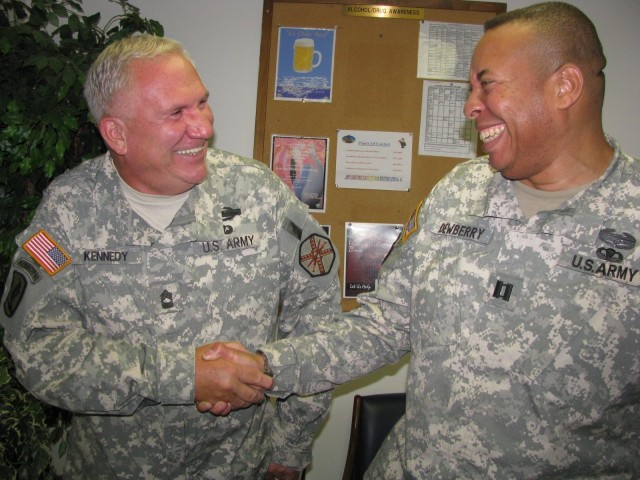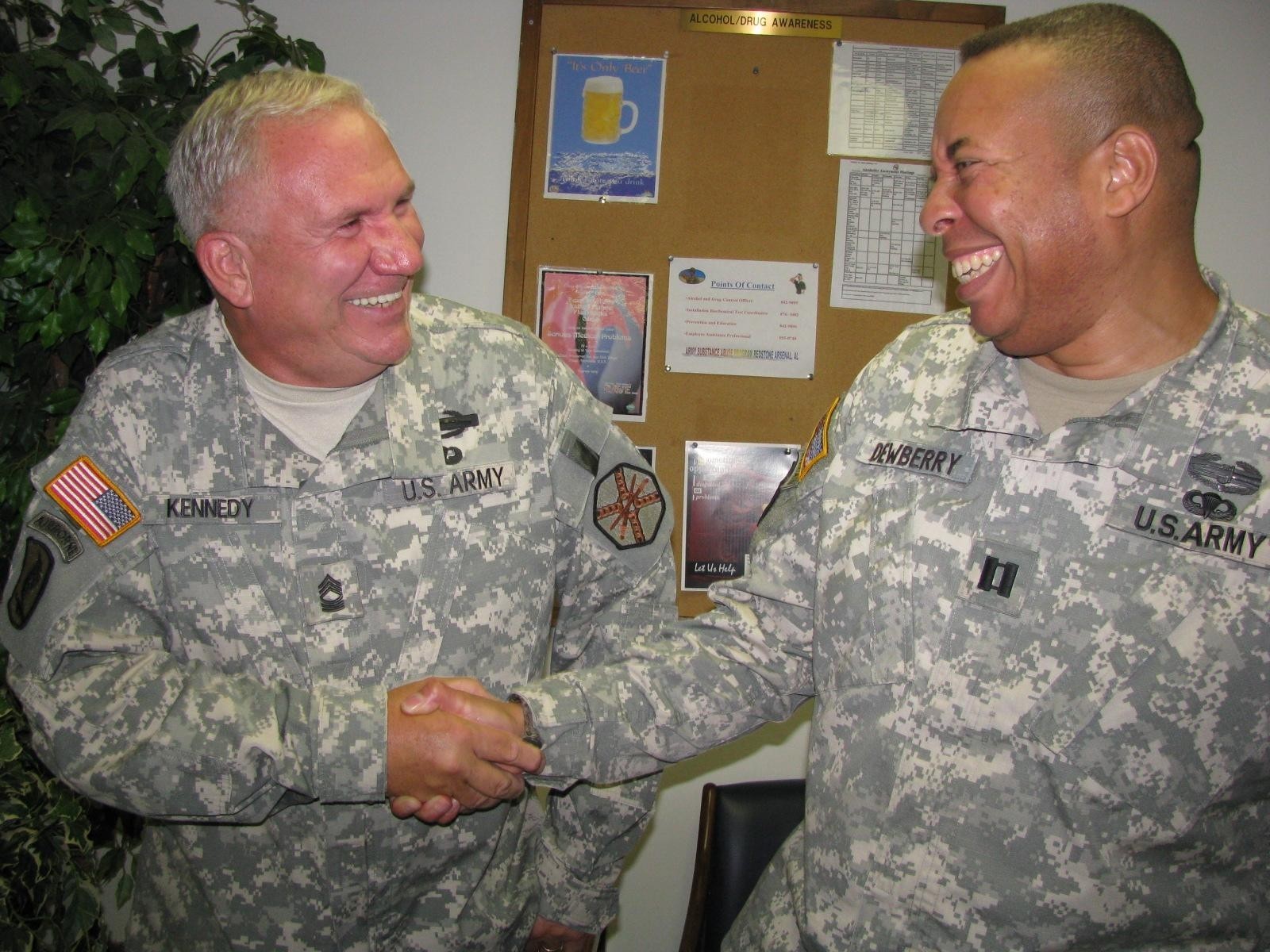
Reserve Master Sgt. John Kennedy has spent a lot of years in his Army boots.
Forty-two and a half, to be exact.
Drafted to serve in Vietnam, Kennedy has been known as Redstone Arsenal's longest serving active duty Reserve Soldier. But on Sept. 1, Kennedy officially retired from his role at Headquarters & Headquarters Garrison Operations, ending a military career that has included tours in Vietnam and Korea, a deployment in Afghanistan, and various medals and honors, including two Purple Hearts, a Bronze Star with Valor and induction in the Madison County Hall of Heroes. He's also enjoyed a civilian career on Redstone Arsenal.
"The Army is probably the best thing that happened to me, even though it wasn't my choice," Kennedy, 61, said. "It taught me discipline, it helped me to mature, it gave me an education, training and lots of opportunities. Because of the training, I was able to work in civil service. And all the people I've met in the Army and government have been great."
But Kennedy said today's young people should look beyond the educational, career and monetary opportunities offered by the Army before they voluntarily make a commitment that will change their life.
"I want young people to do the military for the right reason," he said. "The Army is pushing - they'll give you this and they will give you that, they will give you education, money. But do it because of the honor of serving your country. Do it because you feel in your heart it is something you want to do."
Kennedy will spend his retirement time with his family, which includes his wife, Vicki, who works at AMCOM's Acquisition Center, two sons, a stepson and four grandchildren, doing renovations around his northeast Madison County home and possibly volunteering with groups he has long been associated with as a Redstone Arsenal Soldier, including the North Alabama Veterans Coalition and the Redstone-Huntsville Chapter of the Association of the U.S. Army.
Despite his retirement activities, Kennedy will continue to have a place in his life for Soldiers.
"One thing I will always miss is the camaraderie that you have when you work with Soldiers," Kennedy said. "Even in my civilian career I worked close with Soldiers. That's what I loved the best about my job."
A Bronx, N.Y., native, Kennedy was drafted on May 11, 1966.
"Everybody at that time was being drafted sooner or later. If you didn't go right into college from high school, then you got drafted," he said.
Kennedy served in the infantry "out in the jungle" with the 173rd Airborne Brigade in Vietnam's Central Highlands.
"In November 1967, I fought in the Battle of Dak To," he said. "It took us five days to take a hill. We took it on Thanksgiving Day so Thanksgiving has always had a special meaning for me.
"That's where I received my first Purple Heart. I was going up the hill and I could see bullets coming at me and at the ground."
A minor bullet injury sustained in the battle didn't keep Kennedy off the battlefield. He soon returned to his unit, extended his tour beyond his first year and was injured a second time when a booby trap sent sharp metal flying into his knee.
"I'm embarrassed to say I have two Purple Hearts because my wounds weren't that serious," Kennedy said. "I didn't lose an arm or a leg. I didn't lose my life. But I am proud of my service with the 173rd. It set the path that I am on today."
When he did return from Vietnam, however, Kennedy left the Army.
"I kept extending my time in Vietnam because I didn't want to do any stateside duty. It wasn't the best time for military in the states," he recalled.
"When I did come back, they told me as soon as I leave post to get out of my uniform and don't tell anybody about my service. They told us not to talk about it, to put Vietnam behind us."
Job opportunities in the civilian world were scarce at the time. So, Kennedy rejoined the Army after only a few months with plans to learn an employable skill. In 1971, Kennedy came to Redstone Arsenal for training in Sergeant missile test and repair.
"It was back in the day when you had to learn electronics, and learn about things like tubes and transistors," he said.
He stayed on at the Arsenal as an instructor for about four years. He taught Soldiers about the Sergeant missile system and also about the TOW and Dragon missile systems. Further work in the missile field included two tours in Korea, an assignment at Redstone Arsenal to learn how to use the Land Combat Support System, and stints at Fort Campbell, Ky., and Fort Stewart, Ga.
In November 1979, Kennedy left the Army, joined the Reserves and began a civilian career at Redstone Arsenal as a logistics assistance representative for what was then the Missile Command.
"I worked with land combat systems like TOW and Dragon," he said. "I was a civilian in the field with Soldiers to make sure their equipment was working. I traveled a lot just like in the military. Eventually, I needed to settle down. So I took a job as a configuration manager."
During his civilian career, Kennedy maintained his Reserve status as an Individual Ready Reserve, meaning he didn't participate in military activities but was obligated to respond if activated by Presidential Reserve Callup Authority.
"There weren't any Reserve units with missiles back then," he said. "I was an Individual Ready Reserve for 18 years until I got a call from (then) Sgt. Maj. John Perry and (retired) Col. Walter Lorcheim about a new Reserve ordnance battalion at Redstone Arsenal. They offered me the Operations NCO job."
After the attacks of Sept. 11, 2001, Kennedy transferred to the 926th Engineers. In 2002, he retired from his civilian career and, in 2003, was deployed with the 926th to Afghanistan, where he was the first sergeant for a unit of 140 Soldiers.
"We had very poor facilities when we got to Bagram. Tents were falling down and the living conditions were terrible," he said. "Because we were a unit of engineers, we were able to fix things up to the point where we had one of the best compounds at Bagram. We felt the group commander was jealous of the facilities we set up."
Eventually, the unit was scattered throughout Afghanistan, with some engineers working on the road from Kandahar to Tarin Kowt, and other engineers working on dining facilities and Soldier sleeping quarters at various forward operating bases.
"I traveled by helicopter between six different places where we had Soldiers," Kennedy said. "As the first sergeant, my job was to check on my Soldiers, bring them mail and supplies, make sure their got their leave and things like that.
"I also was in charge of pay issues and personnel actions. But one thing I was most proud of was that I was able to get promotions for my Soldiers. That was difficult because we were a Reserve unit working under a National Guard unit working for the active Army."
Getting his Soldiers promoted meant that Kennedy had to travel to Bagram to participate in promotion boards.
"It's easy to get promoted when you are working in your unit back in the U.S.," he said. "It's a lot harder when you are deployed and you are reporting to National Guard and active Army units. But these Soldiers were in a combat zone, they were far from home and they sacrificed so much. They deserved to get promoted."
When the 926th returned from Afghanistan, Kennedy was ready to hang up his boots. But a call from then Garrison Sgt. Maj. Mark Gerecht led to a full-time assignment with Garrison Operations as an active duty Reservist.
Now, as Kennedy makes retirement official, there is another Kennedy working through the military ranks. 1st Lt. John Kennedy III is a member of the Alabama Army National Guard and is in training at the Arsenal at the explosive ordnance device school. He also has a civilian job on the Arsenal as an environmental contractor for Chugach.
"He joined before he told me what he was doing. At first I didn't like it because there's a war going on. It's all right for me, but not for my kids," said Kennedy.
Kennedy does worry that his son along with even more Soldiers will be embroiled in wars in Iraq, Afghanistan and other parts of the world, and that such military actions could lose the support of Americans at a time when it's most crucial.
"Vietnam and Iraq are the same in that Soldiers are being killed. They are different in that the people back here in the U.S. are supporting the Soldiers more than they ever did before," he said.
"But there's also that pulling out syndrome that we had in Vietnam that is coming along stronger. There's too much time, money and blood spent over in Iraq. To pull out would be a waste. Some 58,000 Soldiers died in Vietnam. We pulled out and they gave their lives for nothing. I would like to see the Iraq Army and government step up more. But I can't see us pulling out of Iraq or Afghanistan right now."
Time is needed in these countries, he said, to build democracy and freedom.
"To be a peaceful nation, it takes a lifetime to come to an understanding and to learn how to live in a democracy," he said. "The children in Iraq and Afghanistan are growing up seeing violence. It's their children who will hopefully live in peace.
"The cost we are paying to help that democracy along is the price you pay for being the big kid on the block."
To Kennedy, serving a lifetime in the Army has been exactly the right course for this Soldier.
"I am so proud and my wife is so proud of my service to my country, both military and civilian," he said.
And he will be missed at Garrison Operations.
"John brought a level of experience that we didn't have," said Capt. Rob Dewberry, commander of Headquarters & Headquarters Company, who said Kennedy's retirement was brought on by an unresolved paperwork issue.
"He was a sounding board, a good friend and a mentor. He has been ingrained with various organizations for having served them, worked with them and worked in them. He's a proven commodity. This is a loss for the Army. It's a shame we are losing his experience because we need that experience, we need the qualities he brings to the game."

Social Sharing